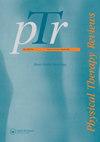Stroke survivor, caregiver and therapist experiences of home-based stroke rehabilitation: a thematic synthesis of qualitative studies
IF 0.8
Q4 REHABILITATION
引用次数: 1
Abstract
Abstract Background Following the initial period of hospitalisation, stroke rehabilitation is increasingly occurring within the home. As such, the home setting becomes a critical environment in the context of rehabilitation service provision. Objectives This study aimed to explore what factors influence the experiences of stroke survivors, caregivers and therapists participating in home-based rehabilitation. Methods A systematic approach to thematic synthesis of qualitative studies began with search term development, followed by database search (CINAHL, Emcare, Medline, Scopus) from inception to 1 November 2022 using keywords and synonyms of ‘stroke survivor’, ‘therapist’, ‘caregiver’, ‘home rehabilitation’ and ‘experience’. Included studies were appraised using the Critical Appraisal Skills Programme (CASP) qualitative checklist. Data were analysed inductively for themes using a three-step thematic synthesis approach. Results A total of 26 studies were included in this thematic synthesis. Across the data, three overarching analytical themes were constructed, including (i) The significance of place, (ii) The impact of relationships, and (iii) The meaning of therapy. Conclusions The home setting offers benefits and challenges to delivery and participation in physical rehabilitation after stroke, shaped by various psychosocial and environmental factors that influence outcomes. Altered roles and relationships developed within the home setting influence participatory experience, whilst the setting can offer a familiar and relevant context to promote engagement in meaningful and purposeful therapy. Prior to hospital discharge, therapists who integrate personalised contexts into therapeutic environments can better prepare stroke survivors and caregivers for therapeutic participation within the home. Furthermore, future studies conducted before, during and after therapy focussing on stroke survivor, caregiver and therapist experiences of home-based rehabilitation can provide greater insight into the barriers and facilitators of home-based rehabilitation acceptance, adherence and implementation.中风幸存者,护理者和治疗师的经验,以家庭为基础的中风康复:定性研究的主题综合
背景在最初的住院期之后,中风康复越来越多地在家中进行。因此,家庭环境成为提供康复服务的关键环境。目的探讨影响脑卒中幸存者、护理人员和治疗师参与家庭康复体验的因素。方法采用系统的主题综合定性研究方法,从搜索词开发开始,然后使用“中风幸存者”、“治疗师”、“护理者”、“家庭康复”和“经验”等关键词和同义词从成立到2022年11月1日进行数据库搜索(CINAHL、Emcare、Medline、Scopus)。使用关键评估技能计划(CASP)定性检查表对纳入的研究进行评估。采用三步主题综合方法对数据进行归纳分析。结果本次专题综合共纳入26项研究。通过这些数据,我们构建了三个主要的分析主题,包括(i)地点的重要性,(ii)关系的影响,(iii)治疗的意义。结论:家庭环境为卒中后的分娩和参与身体康复提供了益处和挑战,受到各种影响结果的社会心理和环境因素的影响。在家庭环境中发展的角色和关系的改变会影响参与性体验,而环境可以提供一个熟悉和相关的背景,以促进参与有意义和有目的的治疗。出院前,将个性化环境融入治疗环境的治疗师可以更好地为中风幸存者和护理人员在家中参与治疗做好准备。此外,未来在治疗前、治疗中和治疗后进行的研究,重点关注中风幸存者、护理者和治疗师的家庭康复经历,可以更深入地了解家庭康复接受、依从性和实施的障碍和促进因素。
本文章由计算机程序翻译,如有差异,请以英文原文为准。
求助全文
约1分钟内获得全文
求助全文
来源期刊

Physical Therapy Reviews
REHABILITATION-
CiteScore
1.30
自引率
0.00%
发文量
26
期刊介绍:
Physical Therapy Reviews is an international journal which aims to publish contemporary reviews, discussion papers and editorials within physical therapy, and in those basic and clinical sciences which are the basis of physical therapy. The journal is aimed at all those involved in research, teaching and practice within the area of physical therapy. Reviews (both descriptive and systematic) are invited in the following areas, which reflect the breadth and diversity of practice within physical therapy: •neurological rehabilitation •movement and exercise •orthopaedics and rheumatology •manual therapy and massage •sports medicine •measurement •chest physiotherapy •electrotherapeutics •obstetrics and gynaecology •complementary therapies •professional issues •musculoskeletal rehabilitation
 求助内容:
求助内容: 应助结果提醒方式:
应助结果提醒方式:


